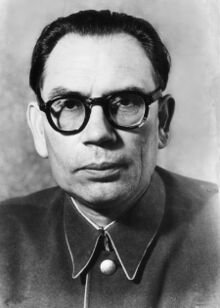Stipo Sevšek
This article is incomplete because it is pending further input from participants, or it is a work-in-progress by one author. Please comment on this article's talk page to share your input, comments and questions. Note: To contribute to this article, you may need to seek help from the author(s) of this page. |
Stipo Sevšek | |
|---|---|
 | |
| Supreme Leader of Zacotia | |
| In office 10 July 1940 – 1 August 1942 | |
| Preceded by | Office established |
| Succeeded by | Office abolished |
| Prime Minister of Zacotia | |
| In office 3 June 1940 – 1 August 1942 | |
| President | Niko Klemen (1940) Himself (as Supreme Leader) |
| Preceded by | Hrvoje Resman |
| Succeeded by | Miran Oman (acting) |
| General Secretary of the Communist Party of Zacotia | |
| In office 30 May 1934 – 1 August 1942 | |
| Preceded by | Tomislav Braèiè |
| Succeeded by | None (party banned) |
| Personal details | |
| Born | Stipo Sevšek 12 December 1889 Ladnica, Zacotia |
| Died | 6 August 1942 (aged 52) Ladnica, Zacotia |
| Cause of death | Execution by firing squad |
| Political party | Communist Party of Zacotia |
| Alma mater | Ladnica Technical School Kmetec III |
Stipo Sevšek (12 December 1889 – 6 August 1942), sometimes written Sevshek, was a Zacotian Flecquist political activist and revolutionary who ruled as the Supreme Leader of Zacotia from 1940 until 1942. His brief rule was characterized by the sudden imposition of totalitarianism on the country and his sweeping purges of political opposition. The effects of his rule are considered to be a primary factor for Luepola's success in the early years of the Great War, as well as Zacotia's eventual alignment with the Vierz Empire in the Silent War and to the present day.
Sevšek was born to a working class family in Ladnica. He worked in both Zacotia and Luepola as a welder, and became entranced by the labour movement in both countries. He joined the All-Zacotia Socialist Workers' League in 1915, and spent three years in prison for union organizing. Upon his release, he joined the banned Communist Party of Zacotia (ZKS) and participated in underground organizing while continuing his work as a welder. The effects of the Great Crash saw support for the ZKS surge, and Sevšek became its general secretary in 1934. After an ZKS victory in the 1939 election, president Niko Klemen appointed Sevšek as prime minister in mid-1940.
With a majority in parliament, Sevšek abandoned any commitment to multi-party democracy and banned most other political organizations, with ZKS at the head of a one-party state. He dissolved the presidency, resulting in Klemen's fleeing to Vierzland, and declared himself supreme leader of the new people's republic. An orthodox Flecquist–Gintzburgist, he pursued policies of rapid industrialization, collective agriculture, and a centralized command economy, believing these to be necessary for the transformation of Zacotia into a communist society. Sevšek wielded secret police and communist paramilitary forces against dissenters, political opponents, and those who resisted the state's economic policies, resulting in the fleeing of hundreds of thousands and an estimated death toll of over 400,000.
An attempted military purge saw widespread resistance against him by the armed forces, and he was deposed and arrested by a group of army officers led by general Mauro Senković in August 1942. Less than a week after his arrest, he was executed by firing squad. His death prompted Anton Marusić to order Luepolan military intervention in Zacotia, starting the Great War.